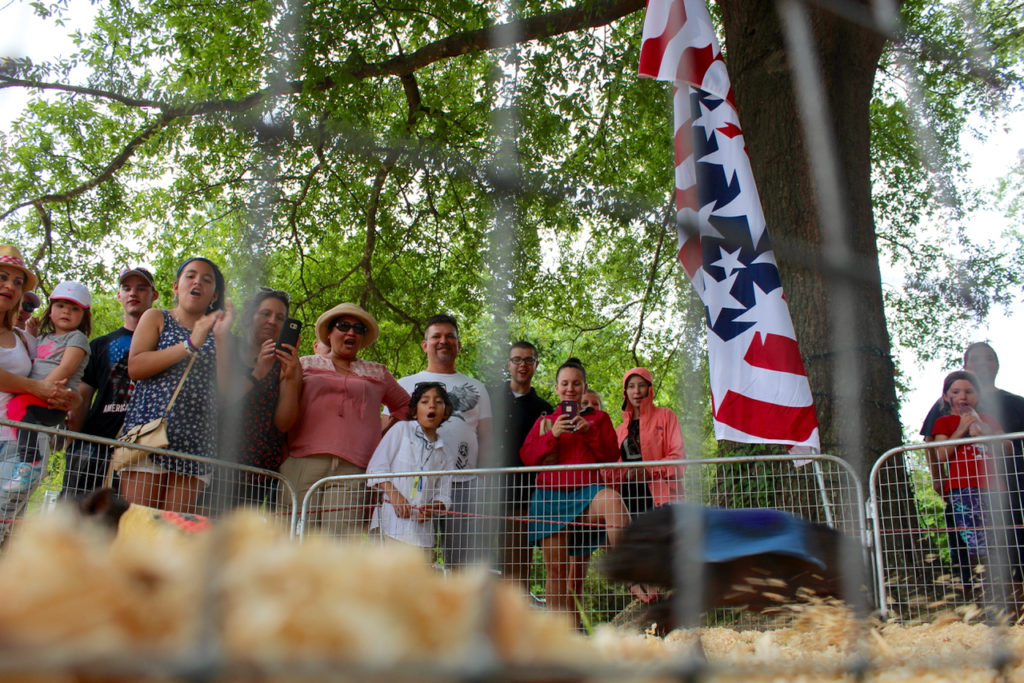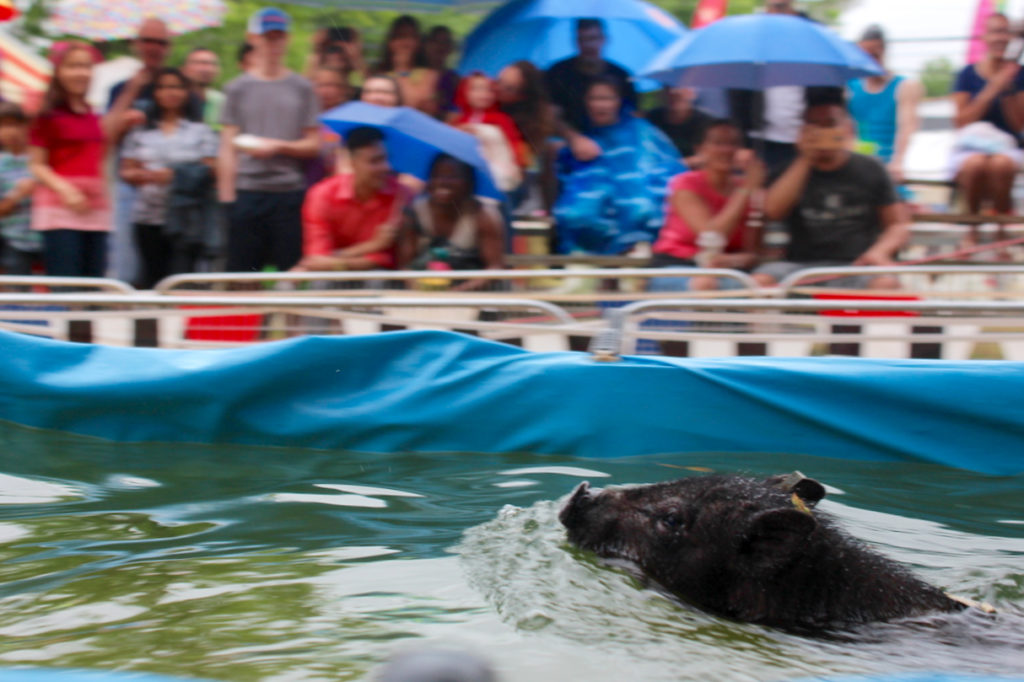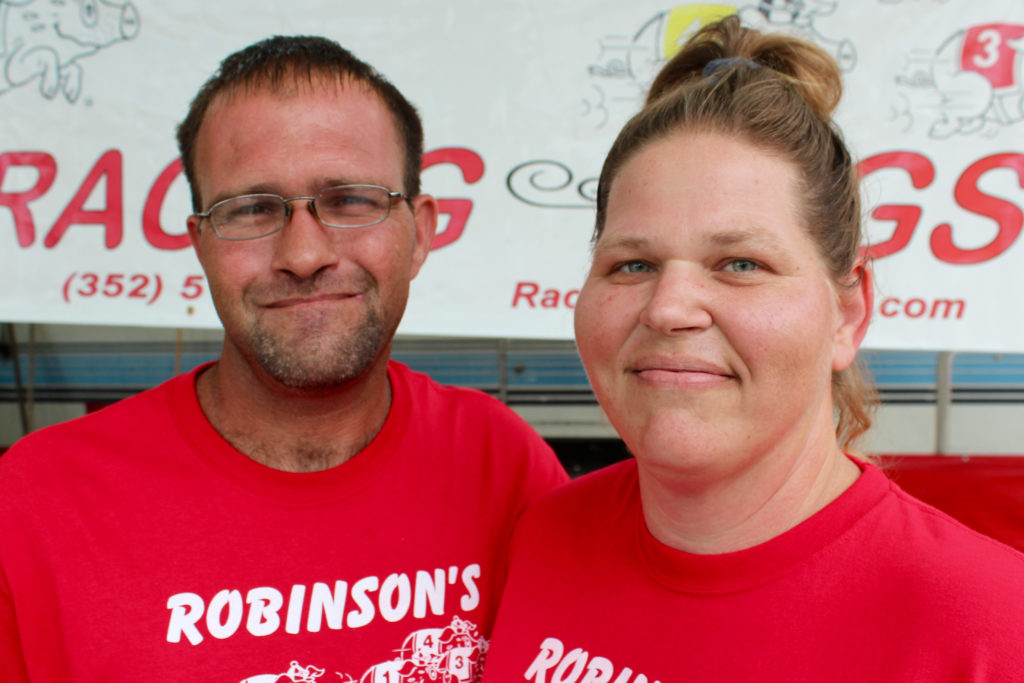
BY VENI FIELDS
PUNGO — Brad Keithly’s hands were trembling slightly as he walked up a set of metal stairs and leaned into the rear side door of a fifth wheel recreational vehicle, or RV, on the bright Saturday afternoon of Memorial Day Weekend.
“All right, you guys?” he called out to the occupants.
It was just before 2 p.m. on the Pungo Strawberry Festival grounds. Bleachers beside the RV were packed with men, women and children, many sipping lemonade in brightly colored plastic cups or holding plates of carnival food. More stood in the shade under a tree next to the RV. Still more stood in the sun at the business end of the RV, the crowd curved around the end of an oval track between the RV and the bleachers.
A few loud squeals emanated from the doorway Keithly was leaning into. He hopped down the stairs, approached a podium, shakily picked up a microphone. A few feet away, Keithly’s partner and race assistant, Ashli Clark, crumbled Oreo cookies into a metal tray, a treat to help inspire the racers. Keithly pressed a button that sounded a recorded race fanfare trumpet.
Robinson’s Racing Pigs and Paddling Porkers were about to take the gate.
It was the second time in his life Keithly had done this. The first was two hours earlier.
Keithly was a landscaper three months before this. Clark worked in the security field. Four of the eight pigs in the RV weren’t born yet.
It’s a learning curve that’s a bit of a family enterprise.
Robinson’s Racing Pigs began in 1985 as a one-time-only event, when Paul and Carlotta Robinson wanted to do something unique for the Florida State Fair, said Randy Ross, Keithly’s brother, and now the owner of Robinson’s.
Paul Robinson had grown up traveling with the circus, Ross said. After Paul and Carlotta were married, they both worked for the Fair. The year of the first pig race, Ross was cooking in a restaurant in Yeehaw, Fla. A friend who owned a fruit stand across the street was working with the Robinsons and asked Ross to help with a project after work. Together, they built the first pig race track and trained the first set of pigs, Ross said. He has been a pig racer ever since.
When the Robinsons died a year apart in the late 1990s, they turned their business over to Ross, who now runs it with his wife, Sharon, from their farm in Fort White, Fla.
They live there now with over 100 retired racing pigs, Ross said. They have bred the Vietnamese potbelly pigs, which typically grow to be about 26 inches tall at the shoulder and weigh up to 250 pounds. A healthy pig’s lifespan can be just about 20 years.
Ross races the pigs for up to seven years, he said. After that, “they tend to get like teenagers and want to do their own thing.” After racing, they retire to the farm or are donated to livestock organizations like 4-H groups, Ross said. None of the Robinson’s racing pigs are slaughtered, he said. They have used a few “meat pigs” in the past, but prefer potbellies for racing.
Early on, there were eleven sets of racing pigs touring around the country, Ross said. At first they merely ran the track. About seventeen years ago, he said, they were looking for something different to add to the race, since so many other pig racing outfits were beginning to crop up after the Robinsons’ success. Arriving home one day in a rainstorm, they saw a mama pig and her babies swimming in their pond, Ross said. The “paddling porkers” part of the race was born.
Now there are two sets of pigs that tour, one that the Rosses run during winter months in Florida, the other that will now be headed by Keithly and Clark around the country from spring until November.
Keithly had been around the races most of his life, but running one hadn’t been a consideration until he got a phone call from his brother in March, he said. An employee had left the company, and Ross was looking for someone to take the race on tour.
Keithly and Clark had worked together on a ranch and been involved with Ross’s racing, and became quick studies in training and racing the pigs, Clark said.
“Just like dogs, they respond to love, attention and affection,” she said. “Pigs are born wild, but they’re very intelligent, so the more you handle them and take care of them, the more they respond.”
They knew what they’d be facing if they did this, including living in the front end of an RV while pigs resided in the back. Each race lasts about seven seconds. The pigs run four quick races, which last about 15 second each, four times a day. The rest is set-up, tear-down, caring for the pigs, a lot of waiting, and driving to the next destination.
However, when Ross called, Keithly said, there was no question they’d take on the challenge.
“Ashli and I gave our two-week notices, trained some pigs, and here we are,” Keithly said. “It’s a little nerve-wracking, but we’re having a great time.”
Along with a little baptism by fire, perhaps. The race’s 150-foot track is comprised of about 50 individual three-foot metal sections that are fastened together with plastic zip ties and lined several inches deep with soft wood shavings. Add in ramps, stairs, a 24-foot-long swimming pool in the center of the ring, and eight pigs – four seasoned, four with minimal training – and glitches can arise.
A couple of escapees via a broken zip tied gate, reluctant newbies, and a porcine belly ache made for a hairy start, but Keithly and Clark took them as lessons they won’t need to repeat as they rack up their experience, they said.
“It’s all part of it,” Clark said. “Every day is different, and this is a great experience and we get to see some great places and meet some wonderful people. We’re having a blast.”
Ed. note — The story has been updated to clarify the duration of races.


The Pungo Strawberry Festival is held over Memorial Day Weekend. Visit pungostrawberryfestival.info for details.
© 2016, 2017 Pungo Publishing Co., LLC

